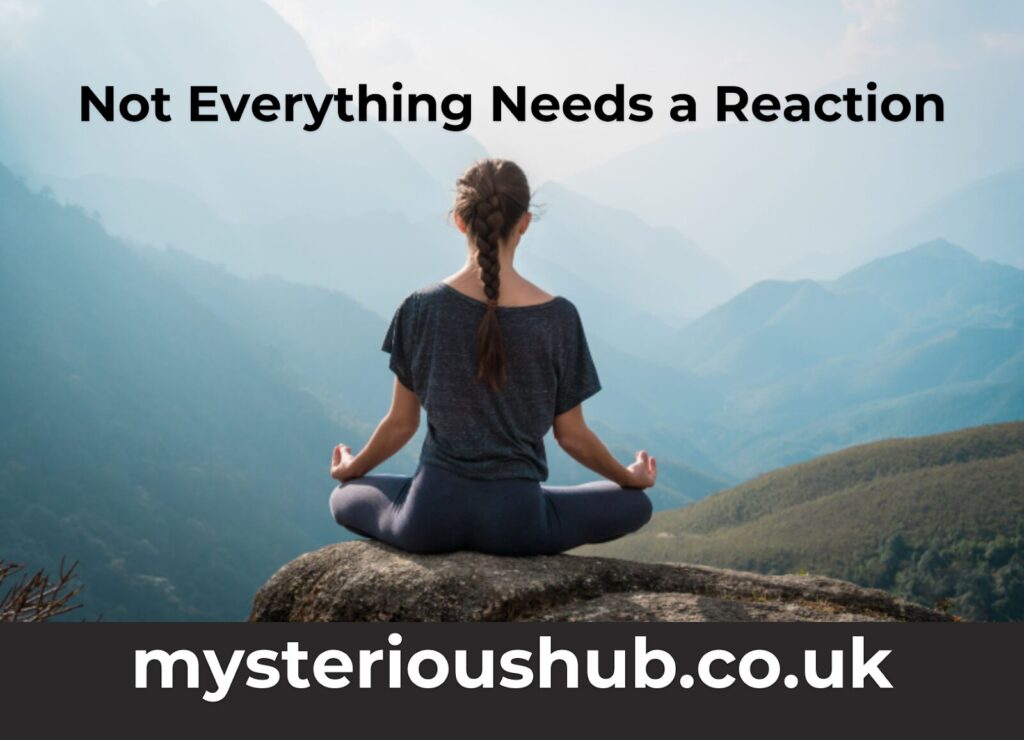Summary
The article emphasizes the importance of resisting the urge to react impulsively and embracing mindfulness and intentionality in handling situations. It explores how non-reactivity can lead to inner peace, better communication, and stronger relationships. Reacting impulsively often results in regret, misunderstandings, and emotional harm, while thoughtful non-reactivity helps break negative behavioural patterns and fosters personal growth.
Not Everything Needs a Reaction
I think it’s important to remember that not everything requires a reaction. Sometimes it’s better just to let things be.
We’ve all been there. Someone says or does something that rubs us the wrong way, and we are urged to react. Maybe we lash out, say something we don’t mean, or do something we later regret. In the moment, it can feel like the only option. But what if it’s not?
What if we could learn to resist the urge to react, and instead approach situations with greater mindfulness and intentionality?
We just have to take a moment to pause and By taking a step back and evaluating whether a reaction is truly necessary, we can approach situations more thoughtfully Trust me, You might be surprised at how much more peaceful and centred you feel when you let things be.
Mastering the Art of Letting Go
Now, I’m not trying to sit here and talk as if I have this mastered because I’m far from it. I’m an amateur as fuck and it’s definitely a learning process. At the very least, I’m aware of the fact that I don’t have to keep explaining or arguing the same argument if it’s going nowhere and turning into a “word” situation. I used to be, and can sometimes still be, the type of person who needs to fight my case until the very end. I will bring up relevant facts and past situations to help back up the fact that I am right. It used to frustrate me to the core when I knew I was right but wasn’t being heard.
I find this the most relevant during fights, because obviously you’re trying to win an argument. I grew up with sisters, so I am no stranger to petty cattiness. I’m well aware that sometimes, the opposing side’s objective isn’t to win, prove their point, or get you to see their side, but sometimes it’s just to get under your skin. I found this to be true in small disagreements and big arguments in past friendships and relationships. Shit, I’d be lying if I said I didn’t know this to be true in my current relationship from time to time as well.
My reflex to verbally react is like second nature. I have a comeback for everything. In the heat of the moment, I couldn’t care less about someone’s feelings, and if that energy is brought to me, I will match it. I used to take pride in being the best pound-for-pound comeback boxer, hitting all the low blows if I found it necessary. For me, everything was the free game in an argument. But the feeling after reacting so nastily would always leave the shittiest taste in my mouth. It was nothing to be proud of, even if I was 100% right in whatever the original argument was.

You know why the best thing we can do is simply let things be.
Here’s why:
1. Mindful non-reactivity can cultivate inner peace
In addition to avoiding negative outcomes, taking a more measured approach can also help us cultivate a sense of inner peace. when we react impulsively, we might feel anxious, angry, or frustrated. By contrast, when we take a more thoughtful approach, we can feel more centred and grounded. This can help us approach life’s challenges with greater resilience and grace.
2. Non-reactivity can help us communicate more effectively
When we react impulsively, we might get sidetracked from our goals and priorities. By taking a more measured approach, we can stay focused on what’s important, and avoid getting bogged down in distractions or drama. This can help us achieve our goals more efficiently, and lead to greater success and fulfilment in our lives.
3. Reacting impulsively can cause harm
When we react impulsively, we might say or do things that we later regret. This can lead to misunderstandings, hurt feelings and damaged relationships. By taking a more measured approach, we can avoid these negative outcomes and build stronger connections with the people around us.
4. Non-reactivity can help us break negative patterns
When we react impulsively, we might be falling into old patterns of behavior that no longer serve us. By taking a more measured approach, we can break these patterns and create new ones that are more aligned with our values and goals. This can help us grow and evolve as individuals, and lead to greater fulfilment and happiness in our lives.
5. Not Everything needs a Reaction
Finally, it’s important to remember that not everything needs a reaction. Sometimes, the best thing we can do is simply be present and mindful. By taking a moment to check in with ourselves, we can determine whether a reaction is truly needed, or whether we can simply let things be.
Non-reactivity can also help us stay focused on our goals
By learning to resist the urge to react, and instead approaching situations with greater mindfulness and intentionality, we can create more positive and fulfilling life for ourselves and those around us.
Conclusion
Non-reactivity is a powerful tool that can help us cultivate inner peace, build stronger relationships, break negative patterns, communicate more effectively, and stay focused on our goals.
FAQs
1. What does “Learn to Sit Back and Observe: Not Everything Needs a Reaction” mean?
It means adopting a mindful approach by pausing before reacting to situations. This allows you to assess whether a reaction is necessary or if letting things be is the better choice.
2. Why is non-reactivity important?
Non-reactivity helps avoid impulsive decisions that can lead to negative outcomes, fosters inner peace, strengthens relationships, and allows for more thoughtful and intentional actions.
3. How does mindful observation benefit relationships?
By observing instead of reacting impulsively, you can communicate more effectively, avoid misunderstandings, and strengthen connections with others.
4. Can non-reactivity help with personal growth?
Yes, it allows you to break negative behavioral patterns, align actions with your values, and approach situations with greater maturity, leading to personal and emotional growth.
5. How can I practice non-reactivity in daily life?
- Pause before reacting to any situation.
- Reflect on whether a reaction is necessary or helpful.
- Focus on staying present and grounded.
- Prioritize your long-term goals over momentary emotions.
6. What are the potential challenges in adopting this mindset?
Initial challenges include overcoming ingrained habits of reacting impulsively and learning to stay calm in emotionally charged situations. Regular mindfulness practice can help address these challenges.
7. Can non-reactivity improve decision-making?
Yes, by taking a step back and assessing situations thoughtfully, you can make more informed and balanced decisions, avoiding unnecessary conflicts or regrets.


